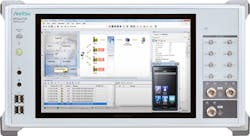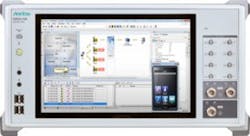Richardson, TX. Anritsu announced it has expanded its mobile-device test portfolio with the introduction of CTIA battery-life test capability for its MD8475B signaling tester. Also available on the MD8475A signaling tester, the CTIA battery-life support, along with the Anritsu SmartStudio Manager interface, allows engineers to conduct battery life tests on mobile devices in accordance with the CTIA Battery Life Test Plan version 1.1 specification.
With the CTIA battery-life test capability, Anritsu said it is addressing a growing market condition caused by the increased use of high-bandwidth applications and multiple apps. Mobile device engineers and operators can use the MD8475B to emulate real-world scenarios for efficient and accurate measurement of the impact popular apps and functions have on battery performance. It is part of Anritsu’s continued emphasis on providing customers with test solutions that meet the various verification processes of 4G and emerging 5G mobile devices.
SmartStudio resides in a computer and can control the MD8475A or MD8475B to conduct the CTIA Battery Life Test Plan measurements. A separate power analyzer to measure the voltage and current is part of the solution, as well. GUI-based SmartStudio makes it easy to configure a smartphone test environment by eliminating the need to create complex test scenarios. Various parameters, such as the frequency and control status, are set at the GUI to run one-touch tests—including reject tests that cannot be run easily on live networks. Eliminating the need to create test cases or understand signaling protocols makes it easier to focus on testing smartphone functions and performance.
The MD8475A and MD8475B signaling testers are all-in-one base station simulators supporting LTE, LTE-Advanced, W-CDMA/HSPA/HSPA Evolution/DC-HSDPA, GSM/GPRS/EGPRS, CDMA2000 1X/1xEV-DO Rev. A, and TD-SCDMA/TD-HSPA. In addition to battery tests, the MD8475A/B support other measurement environments, including maximum throughput performance tests and stress tests of LTE terminals. They also conduct CS fallback, call-connection reliability and stability tests at handover, communication tests at low RF power, and offloading from LTE to WLAN tests.
About the Author

Rick Nelson
Contributing Editor
Rick is currently Contributing Technical Editor. He was Executive Editor for EE in 2011-2018. Previously he served on several publications, including EDN and Vision Systems Design, and has received awards for signed editorials from the American Society of Business Publication Editors. He began as a design engineer at General Electric and Litton Industries and earned a BSEE degree from Penn State.

